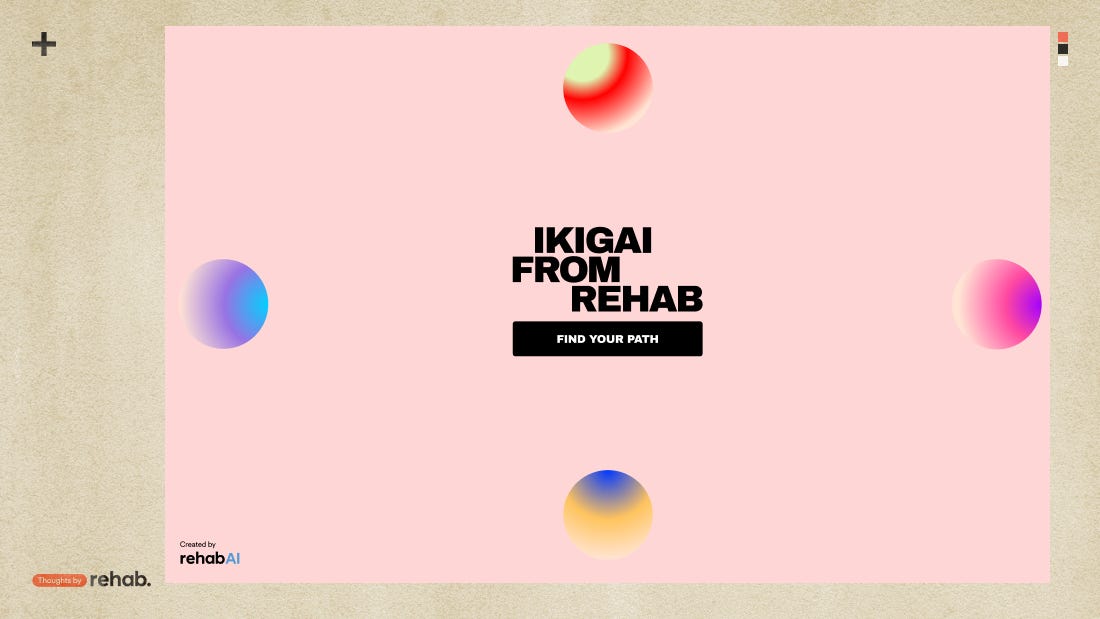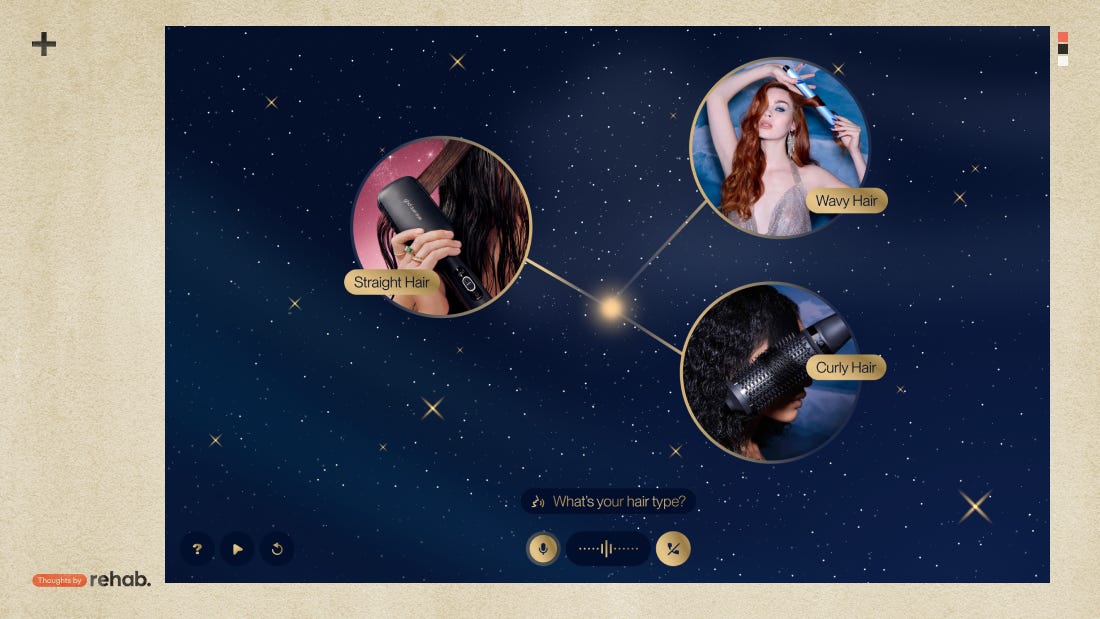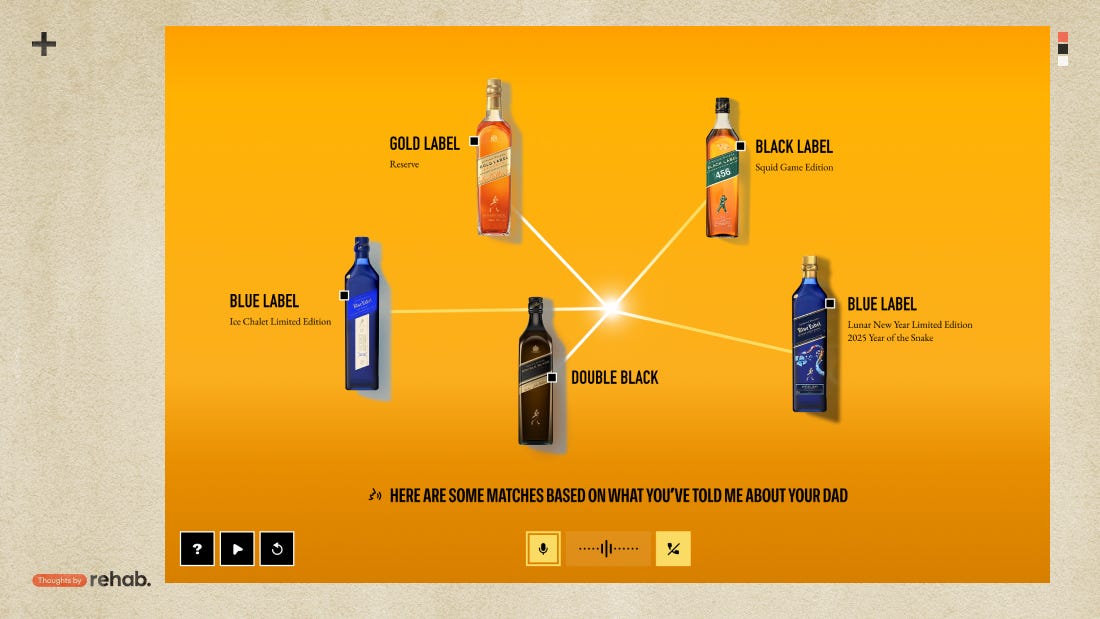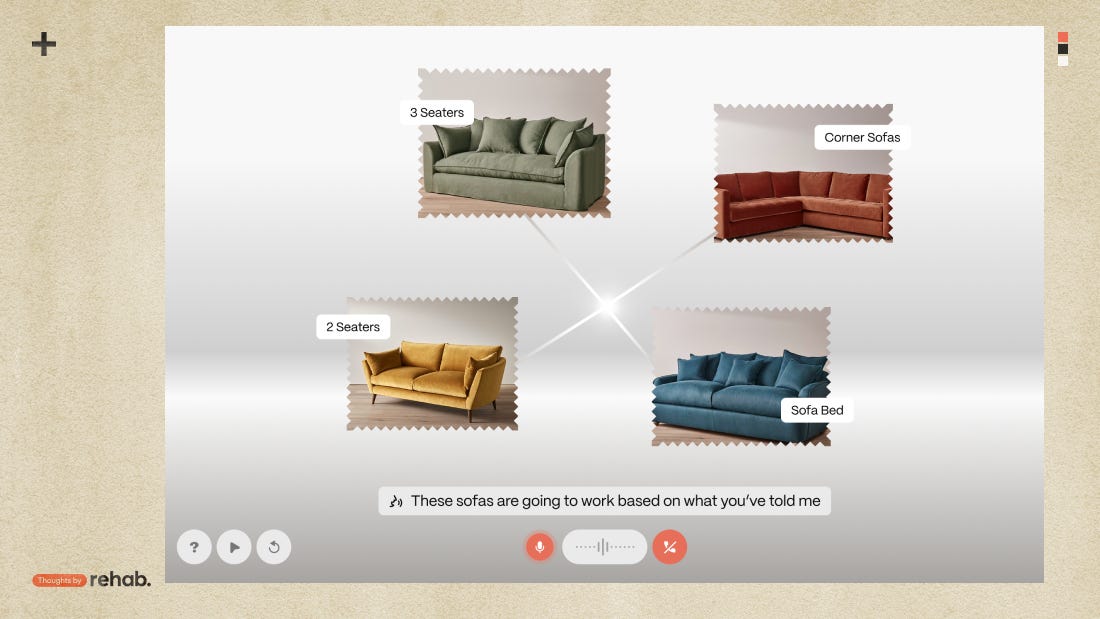Ikigai: The Future of AI-Driven Decision Making, Starting with Your Career
From Career Exploration to Smarter Shopping—How AI is Transforming Product Discovery, Gifting, and Customization
TL;DR: Ikigai was built to help creative professionals navigate career transitions with clarity, offering AI-driven guidance that feels intuitive, personal, and dynamic. Designed to move beyond rigid job boards, it enables career exploration through conversation, real-world insights, and interactive AI personas. As we developed Ikigai, we realized the same AI-driven approach could solve decision-making challenges in product discovery, gifting, and customization—bringing confidence and ease to both careers and commerce.
Rehab’s Hackweek: Where Ikigai Was Born
At Rehab, Hackweek is where we challenge ourselves to use tech in ways that truly matter—not just to automate, but to empower. With AI accelerating across industries, we wanted to push beyond the hype and explore how it could solve real, human-centered problems.
This year, one issue stood out: uncertainty.
The creative, marketing, and advertising industries have faced massive shifts—layoffs, budget cuts, and changing workplace policies—leaving many professionals questioning their next move. Traditional job boards and career tools weren’t built for nonlinear, creative careers, offering listings but little clarity. We created Ikigai to change that—a tool designed to help professionals explore new paths, understand where their skills fit, and confidently navigate what’s next.
Ikigai: AI-Powered Decision Intelligence
We knew that AI could do more than match keywords on a résumé to job listings. Inspired by the Japanese concept of Ikigai—which helps people align what they love, what they’re good at, and what the world needs—we set out to build a system that felt less like a job board and more like a career guide.
🔹 Conversational, not transactional – Instead of static lists and rigid filters, Ikigai listens, interpreting natural language to uncover skills, interests, and values.
🔹 Personalized career exploration – AI-driven personas simulate real professionals, letting users ask, “What’s your day like?” “How did you get here?” and receive contextually relevant insights.
🔹 Dynamic, real-time recommendations – Rather than presenting generic options, Ikigai maps out unique career paths based on personal strengths and aspirations.
The result? A smarter, more intuitive way to explore possibilities. Instead of being forced into predefined roles, people could discover careers that actually fit them. Here’s a quick video of Ikigai in action.
Video Demo
The Aha Moment: From Career Exploration to Commerce
As we built Ikigai, we realized something: this wasn’t just a career problem. The same barriers—fragmented discovery, overwhelming choices, and lack of confidence in decision-making—existed in e-commerce, gifting, and product customization.
Just like job seekers struggle to navigate career options, consumers face the same uncertainty when shopping online. What if AI could offer the same intelligent, intuitive experience for brands, guiding customers through complex decisions with confidence?
That’s when we knew: Ikigai wasn’t just about careers. It was a blueprint for solving some of the biggest challenges in digital commerce.
A Smarter Way to Shop
Consumers expect fast, intelligent, and effortless online shopping—but most e-commerce platforms fail to deliver. Poor product discovery, impersonal gifting, and clunky customization experiences create hesitation and frustration. The brands that win in 2025 won’t just digitize shopping; they’ll reimagine it entirely with AI-powered, multimodal experiences that guide, personalize, and simplify every step of the journey.
✅ AI-Powered Product Discovery – Shift from keyword search to conversational, intent-driven recommendations.
✅ Smart Gifting Assistants – Remove the guesswork and make gifting frictionless.
✅ Intuitive Customization – Turn complex decisions into interactive, confidence-building experiences.
Key Insight: The brands that integrate AI to enhance—not replace—human decision-making will create shopping experiences that feel truly effortless.
Product Discovery Is Broken—Here’s How to Fix It
🔍 The Problem: A Crisis of Trust and Relevance
E-commerce was built for a search-driven internet, but shopping behavior has shifted—discovery now happens passively through social algorithms, viral trends, and influencer-driven recommendations. Platforms like TikTok and Instagram prioritize engagement over intent, forcing brands to chase fleeting visibility rather than fostering meaningful connections. Meanwhile, traditional e-commerce search remains clunky and outdated, delivering irrelevant results and rigid filters that frustrate consumers. Brands invest in high-quality storytelling and expert-driven content, yet much of it vanishes after a campaign ends, buried under poor search functionality and outdated interfaces. The result? Consumers are overwhelmed with products they don’t need while struggling to find what they actually want.
69.57% of shopping carts are abandoned due to poor online shopping experiences. (Drip.com)
60% of consumers don’t trust online reviews due to fake endorsements. (FashionDive)
88% of users won’t return to a site after a frustrating search experience. (Coolest Gadgets)
💡 The Fix: AI-Powered, Conversational Discovery
Instead of forcing users to guess the right keywords or navigate endless filters, the approach we took with Ikigai transforms product discovery into a conversation-first, multimodal experience. Just as Ikigai interprets career aspirations beyond job titles, AI-driven shopping understands what a consumer actually needs—even if they don’t know how to articulate it. A traveler searching for a lightweight laptop with long battery life shouldn’t have to manually compare specs across multiple product pages; they should be able to say, “I need a laptop that lasts all day without charging and fits in a carry-on,” and receive curated, relevant recommendations instantly.
Ikigai’s dynamic UI and infinite canvas approach, designed to visualize career paths fluidly, can be applied to product discovery in a way that moves beyond static search lists. Instead of presenting a rigid page of results, AI-powered discovery surfaces products within an interactive, contextual journey—mapping out relationships between items, connecting expert-backed insights, customer reviews, and complementary purchases in a seamless, intuitive way. This multimodal experience ensures that shoppers don’t just find a product—they understand why it’s the right choice, making every step of the journey feel more human, guided, and confidence-driven.
Ask, Don’t Search – Consumers should be able to say, "I need a lightweight laptop for travel," and get curated recommendations, not endless filters.
Dynamic, Visual Navigation – Instead of scrolling through rigid search results, shoppers explore products in an intuitive, interactive format.
Trusted, Expert-Driven Content – AI integrates verified reviews, expert opinions, and user insights directly into the experience, removing doubt.
🚀 Example: A shopper looking for a professional camera shouldn’t have to decipher spec sheets. AI asks about their photography style and experience level and recommends the right gear with context, not clutter.
Gifting Should Be Effortless, Not Overwhelming
🎁 The Problem: The Digital Gifting Nightmare
E-commerce was built for a search-driven internet, but shopping behavior has shifted—discovery now happens passively through social algorithms, viral trends, and influencer-driven recommendations. Platforms like TikTok and Instagram prioritize engagement over intent, forcing brands to chase fleeting visibility rather than fostering meaningful connections. Meanwhile, traditional e-commerce search remains clunky and outdated, delivering irrelevant results and rigid filters that frustrate consumers. Brands invest in high-quality storytelling and expert-driven content, yet much of it vanishes after a campaign ends, buried under poor search functionality and outdated interfaces. The result? Consumers are overwhelmed with products they don’t need while struggling to find what they actually want.
74.12% of all online carts are abandoned—gifting purchases being a major contributor. (Baymard Institute)
39% of mobile shoppers abandon purchases when required to enter too much personal info—an issue common in gifting. (ResultFirst)
18% of consumers won’t buy if return policies are unclear—a major pain point for gift buyers. (Baymard Institute)
🎯 The Fix: AI-Driven Gifting Assistants
The solution isn’t more choices—it’s smarter guidance. Just as Ikigai’s AI-driven approach helps users navigate career decisions by understanding intent, the same technology can transform gifting by eliminating uncertainty and personalizing recommendations. Instead of overwhelming shoppers with endless product lists, an AI-powered gifting assistant engages in a guided conversation, refining options based on who the gift is for, their interests, past purchases, and even contextual clues like special occasions or personal style.
By applying Ikigai’s multimodal approach, gifting becomes an interactive, visually rich experience rather than a static product search. Instead of scrolling through pages of items, users can explore an infinite canvas of curated recommendations, dynamically surfacing expert insights, real customer testimonials, and personalization options. AI doesn’t just suggest a product—it provides confidence, validating choices through a blend of context, relevance, and recipient preferences, making the process feel effortless rather than overwhelming.
Guided Conversations, Not Guesswork – Instead of browsing aimlessly, users describe the recipient (e.g., “My dad loves whiskey but already has a collection”), and AI asks follow-up questions to refine recommendations.
Personalization Without the Pain – AI analyzes context clues (style preferences, past purchases, uploaded photos) to suggest the perfect gift without requiring endless input.
Clear, Confidence-Boosting Validation – AI surfaces trusted expert opinions, return policies, and side-by-side comparisons to eliminate purchase anxiety.
🚀 Example: A whiskey enthusiast doesn’t need another generic bottle. AI suggests rare, collector’s editions, custom tasting experiences, or premium accessories—all tailored to the recipient’s tastes.
Customization Should Feel Empowering, Not Exhausting
🛠️ The Problem: Confusing, Clunky Customization
Customization should be one of e-commerce’s biggest strengths, allowing consumers to create products tailored to their exact needs—but instead, it’s often a frustrating, unintuitive process. Most online configurators overwhelm users with technical jargon, endless dropdown menus, and unclear options, making decisions harder rather than easier. Shoppers frequently don’t know which features matter, which upgrades are necessary, or how different configurations will impact performance, quality, or durability. Without clear guidance, they either abandon the process entirely or over-customize, adding unnecessary features out of fear of making the wrong choice. Worse still, most platforms fail to provide real-time visualization, forcing consumers to guess how their selections will look or function in the final product. Instead of feeling empowered, shoppers end up confused, hesitant, and more likely to second-guess their purchase—leading to high abandonment rates and lost sales.
70% of shoppers abandon their carts when customization is too complex. (Plattar.com)
36% more likely to complete a purchase when given a clear, intuitive customization experience. (ExplodingTopics.com)
Interactive 3D previews reduce returns by up to 35%, yet most e-commerce platforms fail to implement them effectively. (Expivi.com)
🎨 The Fix: AI-Driven Customization That Feels Effortless
Instead of rigid dropdown menus and static product images, Ikigai’s AI-powered customization approach transforms decision-making into a guided, intuitive process. Just as Ikigai helps career explorers refine their options by understanding their strengths and goals, the same AI-driven methodology can remove friction from customization. Rather than expecting shoppers to decipher technical specs, filter through endless variations, or guess which upgrades are necessary, AI engages them in a conversational, dynamic process—asking simple, relevant questions to determine their needs. A shopper configuring a laptop, for example, doesn’t need to know the difference between RAM speeds or GPU models; they simply indicate whether they need it for gaming, video editing, or everyday use, and AI intelligently adjusts recommendations in real time.
Ikigai’s multimodal, infinite canvas approach also brings much-needed visual clarity to the customization experience. Instead of forcing users to rely on text descriptions, AI generates real-time 3D previews, interactive AR models, and side-by-side comparisons to help them see exactly how different configurations impact the final product. By integrating smart recommendations, expert-backed insights, and contextual explanations, AI eliminates uncertainty and validates decisions, ensuring that every customization choice feels intentional rather than overwhelming. This reduces abandonment rates, increases purchase confidence, and makes the entire process feel seamless, empowering consumers to create products that truly match their needs.
Conversational Customization – Instead of picking from endless dropdowns, users answer simple questions, and AI dynamically configures the best options.
Smart Recommendations, Not Up-Sells – AI explains why certain upgrades matter (e.g., “This leather will last twice as long”), so users feel empowered, not pressured.
Real-Time Visualization – 3D renders, AR previews, and instant comparisons let users see exactly what they’re getting—reducing returns and boosting confidence.
🚀 Example: A shopper designing a sofa doesn’t need to guess how fabrics will look in their home. AI analyzes room photos, suggests colors, and renders real-time previews to ensure the perfect fit.
The Future of Digital Commerce Starts Here
Brands that integrate AI-powered discovery, gifting, and customization will outpace competitors, reduce friction, and deliver shopping experiences that feel effortless.
🔹 Ikigai is proof that AI can transform shopping from frustrating to seamless.
🔹 The brands that embrace multimodal AI will convert more, retain more, and redefine what seamless shopping looks like.
🚀 The question isn’t whether AI will change commerce—it’s whether your brand will lead or be left behind.







